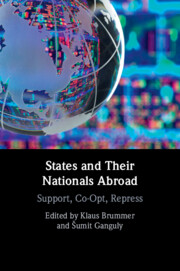Book contents
- States and Their Nationals Abroad
- States and Their Nationals Abroad
- Copyright page
- Dedication
- Contents
- Figures
- Tables
- Contributors
- 1 States’ Interactions with Their National Communities Abroad
- 2 India
- 3 Mexico
- 4 Russia
- 5 China
- 6 Pakistan
- 7 Philippines
- 8 The United Kingdom
- 9 Indonesia
- 10 Germany
- 11 Egypt
- 12 Türkiye
- 13 The United States
- 14 Comparative Insights into States’ Support, Co-optation, and Repression of Their National Communities Abroad
- Index
- References
7 - Philippines
Valuing Human Assets
Published online by Cambridge University Press: 04 December 2024
- States and Their Nationals Abroad
- States and Their Nationals Abroad
- Copyright page
- Dedication
- Contents
- Figures
- Tables
- Contributors
- 1 States’ Interactions with Their National Communities Abroad
- 2 India
- 3 Mexico
- 4 Russia
- 5 China
- 6 Pakistan
- 7 Philippines
- 8 The United Kingdom
- 9 Indonesia
- 10 Germany
- 11 Egypt
- 12 Türkiye
- 13 The United States
- 14 Comparative Insights into States’ Support, Co-optation, and Repression of Their National Communities Abroad
- Index
- References
Summary
The Philippine state considers its citizens living and working abroad as valuable assets, given their contribution to the economic growth and development of the home country. Philippine state interactions with its nationals overseas are largely characterized by engagement, support, and protection. This chapter examines how the Philippine government has implemented its diaspora policy over time. The chapter also underscores the protection of Filipino nationals as a principal task of the state which is conducted mainly through diplomacy, albeit at times supported by the military through rescue operations during crises. Legal frameworks and institutions have been established to cater to the needs of Filipino migrants abroad, especially those of Overseas Filipino Workers (OFWs). The government has also actively entered into bilateral labor agreements and international conventions to promote their rights and welfare. While government agencies are organized to cater to this sector of society, there are limitations on state capacity such as bureaucratic inefficiencies and financial constraints. A comprehensive and inclusive multisectoral approach needs to be adopted, allowing other stakeholders aside from the government to take part in addressing key issues that concern the safety and welfare of Filipinos overseas.
Keywords
- Type
- Chapter
- Information
- States and their Nationals AbroadSupport, Co-Opt, Repress, pp. 157 - 182Publisher: Cambridge University PressPrint publication year: 2024

